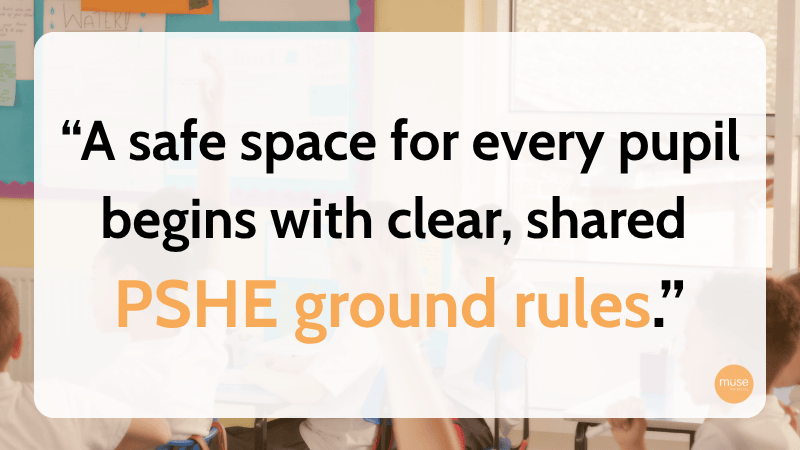PSHE and RSE Ground Rules
Nov 12
/
Muse Wellbeing

Author: David
David is the Muse Wellbeing director and lead curriculum developer. His Main passions include education, surfing and travelling.
David is the Muse Wellbeing director and lead curriculum developer. His Main passions include education, surfing and travelling.

Edited/Reviewed: Tashia
Tashia is a SENCO and LSA support lead with a love for inclusive education. An avid gardener, she enjoys the outdoors and hiking.
A comfortable, supportive and safe environment is essential for effective learning in the PSHE classroom. Because PSHE covers a wide range of sensitive and sometimes emotive topics, lessons depend on positive and respectful participation from pupils. Establishing clear PSHE and RSE ground rules helps ensure every student feels involved, valued and safe during discussions in PSHE (Personal, Social, Health and Economic education) and RSE (Relationships and Sex Education) lessons.
PSHE ground rules help teachers maintain an inclusive and safe classroom environment. They outline how pupils should behave, listen and contribute, ensuring discussions remain respectful and supportive. Clear PSHE and RSE ground rules are especially valuable when teaching sensitive topics such as relationships and puberty education, helping pupils learn with confidence and understanding.
Why Pupil Collaboration Matters in PSHE Lessons
The most effective way to foster an environment of respect and safety is to establish PSHE ground rules through proactive collaboration with pupils. This shared approach between teachers and students not only promotes a structured and supportive space but also helps pupils feel confident to reflect and engage on more personal levels.
Following these ground rules encourages pupils to share their views and respect the opinions of others. Active involvement helps children understand the importance of listening without interrupting, keeping class discussions confidential and avoiding personal questions.
Why Do PSHE Ground Rules Matter?
Ground rules clearly define types of behaviors and interactions that are acceptable within the classrooms. PSHE and RSE rules apply to everyone, including teachers and pupils.
PSHE and RSE in the Primary Curriculum
A shared understanding of how to behave and communicate between teachers and pupils makes PSHE and RSE lessons a vital part of the primary curriculum. PSHE (Personal, Social, Health and Economic education) helps children develop key skills in health, wellbeing and relationships as well as economic awareness.

In primary schools, RSE focuses mainly on relationships including friendships, families and respect for others. As part of the wider PSHE curriculum it ensures children view these lessons as a normal part of their learning rather than a separate or isolated subject.
Build Trust and Encourage Participation
Ground rules help pupils feel confident and safe in the classroom so they can share thoughts without fear of judgment or embarrassment. When pupils are not worried about being laughed at or interrupted by others, they are more likely to speak up and take part in discussion.
Exploring PSHE topics for primary schools like consent, online interactions and family life requires a sense of confidentiality so that sensitive issues can be explored without personal disclosure. Children should also feel comfortable with the idea that different opinions can exist within the same classroom.
Core PSHE Ground Rules for Pupils
Each classroom environment is unique, but PSHE ground rules remain consistent across most UK primary schools. Teachers may phrase certain rules differently, yet the main purpose is always the same: to create a safe and supportive environment for pupils. Below are some key PSHE and RSE ground rules that should be reinforced throughout the year.
1. Listen Respectfully
Every pupil must be respectful towards others in the class. No one should interrupt or talk over another person, and everyone should value each other’s thoughts. This encourages empathy and models kindness, both of which are core aims of PSHE.
2. Use Kind Language
Important and sensitive topics are discussed in PSHE and RSE lessons, so suitable language should always be used by pupils and teachers. This means avoiding slang, rude or hurtful terms. Teachers can guide children to use appropriate vocabulary when talking about family, friendships and relationships.
3. Respect Others’ Views
Pupils in the same class may share different views and opinions. PSHE ground rules should make clear that everyone must respect the opinions of others, even when they disagree. Making someone feel embarrassed or wrong for sharing their personal beliefs is unkind, and pupils should be reminded to practise mutual respect at all times.
4. Take Part Positively
Everyone should take part in PSHE and RSE lessons. Teachers should never pressure pupils to speak about anything they are uncomfortable with, always respecting personal boundaries. The level of contribution will vary, but every pupil’s voice should be heard and valued equally.
How to Set PSHE Ground Rules in Classrooms?
Ground rules work best when pupils actively take part in setting them. When teachers involve pupils in creating PSHE ground rules, it helps promote a safe and comfortable classroom environment where everyone feels respected and heard. Co-creating rules gives pupils ownership and helps them understand why boundaries are important during discussions, especially in PSHE and RSE lessons.
A practical approach is to initiate an open conversation about what respectful dialogue looks like in the classroom. Invite pupils to suggest what helps them feel secure when exploring sensitive topics, then agree on a final list of expectations together. Once established, display these PSHE ground rules prominently as a visual reminder. Returning to them at the start of each new unit or before addressing more complex RSE content reinforces consistency and accountability for all.
Modelling Ground Rules as a Teacher
Teachers play a central role in creating a supportive classroom culture and modelling respectful communication. Pupils quickly mirror the behaviour of adults, particularly their teachers, so consistency and calmness are key.
- Listen attentively without interrupting pupils who are sharing something sensitive
- Acknowledge different viewpoints neutrally without drawing attention to individual pupils
- Avoid framing personal opinions as “right” or “wrong”
- Manage discussions calmly when sensitive or controversial topics arise
- Reinforce kindness and empathy through their tone and choice of language
Final Thoughts - Embedding PSHE Ground Rules
Creating and maintaining PSHE and RSE ground rules is not simply a matter of classroom management. It is about nurturing mutual respect, emotional safety and open dialogue. Clear, consistent ground rules also help pupils build positive social skills that extend beyond the classroom.
Ground rules transform sensitive discussions into safe and inclusive learning spaces. Cooperation, reflection and effective communication are essential life skills that develop naturally when pupils learn within a respectful and supportive environment.
Muse Wellbeing
Subscribe for RSHE & Wellbeing Updates & Learning Resources
Receive essential information on RSHE and wellbeing for your school and community
Thank you!

Copyright © 2026 Muse | All Rights Reserved.
Would you like to logout of Muse Wellbeing?


